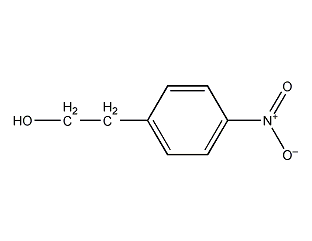4-Nitrophenethyl Alcohol 4-Nitrophenethyl Alcohol


Structural formula
| Business number | 02HK |
|---|---|
| Molecular formula | C8H9NO3 |
| Molecular weight | 167.16 |
| label |
p-Nitrophenyl alcohol, 4-Nitrophenylethyl alcohol, O2NC6H4CH2CH2OH, Aurora ka-7063, beta-(P-Nitrophenyl)ethanol, 4-Nitrobenzeneethanol, 4-Nitrophenethyl alcohol, Akos 90322, 2-(P-Nitrophenyl)ethanol, 2-(4-Nitrophenyl)ethanol, 2-(4-Nitrophenyl)ethyl alcohol |
Numbering system
CAS number:100-27-6
MDL number:MFCD00010202
EINECS number:202-835-8
RTECS number:SG8602000
BRN number:1866148
PubChem number:24886589
Physical property data
1. Character: This product is yellow or slightly yellow crystal
2. Density (g/mL, 20℃): Undetermined
3. Relative vapor density (g/ mL, air = 1): Undetermined
4. Melting point (ºC): 59-62
5. Boiling point (ºC, normal pressure): Undetermined
6. Boiling point (ºC, 16mmHg): 177
7. Refractive index: Undetermined
8. Flash point (ºC): Undetermined
9. Specific rotation (º): Not determined
10. Autoignition point or ignition temperature (ºC): Not determined
11. Vapor pressure (mmHg, 20ºC): Not determined Determined
12. Saturated vapor pressure (kPa, ºC): Undetermined
13. Heat of combustion (KJ/mol): Undetermined
14. Critical Temperature (ºC): Undetermined
15. Critical pressure (KPa): Undetermined
16. Log value of oil-water (octanol/water) partition coefficient: Undetermined
p>
17. Explosion upper limit (%, V/V): Undetermined
18. Explosion lower limit (%, V/V): Undetermined
19. Dissolution Gender: Undetermined
Toxicological data
Mutagenicity: Mutant microorganism test: bacteria-Salmonella typhimurium, 3333μg/plate;
Ecological data
None yet
Molecular structure data
1. Molar refractive index: 43.88
2. Molar volume (cm3/mol): 131.5
3. Isotonic specific volume (90.2K ): 356.0
4. Surface tension (dyne/cm): 53.6
5. Dielectric constant:
6. Dipole moment (10-24cm3):
7. Polarizability: 17.39
Compute chemical data
1. Reference value for hydrophobic parameter calculation (XlogP): None
2. Number of hydrogen bond donors: 1
3. Number of hydrogen bond acceptors: 3
4. Number of rotatable chemical bonds: 2
5. Number of tautomers: none
6. Topological molecule polar surface area 66
7. Number of heavy atoms: 12
8. Surface charge: 0
9. Complexity: 147
10. Number of isotope atoms: 0
11. Determine the number of atomic stereocenters: 0
12. Uncertain number of atomic stereocenters: 0
13. Determine the number of chemical bond stereocenters: 0
14. Number of uncertain chemical bond stereocenters: 0
15. Number of covalent bond units: 1
Properties and stability
None yet
Storage method
None yet
Synthesis method
None yet
Purpose
Used in organic synthesis